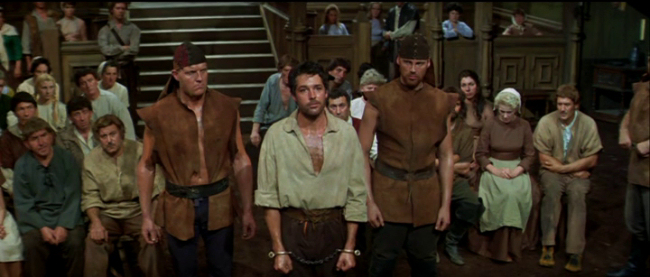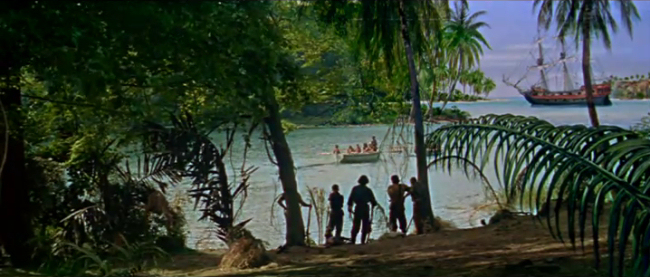
A movie can exist without any semblance of meaning. The patterns of an adventure film are so well established in the collective conscience that nearly everything the characters do and say can make no sense at all and still a movie will stagger into existence by sheer habit, a movie like 1962's The Pirates of Blood River. This pirate film by Hammer has an impressive performance from Christopher Lee, extraordinarily cheap production values, characters whose motivations seemingly come from nowhere and, to put it mildly, an inaccurate impression of history.

Jonathon (Kerwin Mathews) is discovered having an affair with another man's wife in the late 17th century Huguenot colony of Devon. What, you say, Devon in England? No, this is an island. What, you say (googling), the enormous uninhabited island north of Canada? No, this island has piranhas which quickly devour the Jonathon's lover, which is seen by the colony elders as evidence of god's judgement.

Well, that at least sounds like 17th century Protestants. The enormous statue of the colony's founder somewhat less so. An opening title card informs us that this colony has been corrupted by greed which is used to explain why Jonathon is banished to an unnamed penal colony, apparently elsewhere on the island, for adultery. You read that right, it doesn't make the slightest bit of sense.
Jonathon keeps saying at his trial with a look of complete innocent sincerity, "I can explain!" They never let him finish which would have been great. I really would've liked to have known what he was going to say: "I can explain! Our people are mistaken in their belief that adultery is wrong because I'm in love!" Sorry, Jonathon, you did the crime, you're off to the quarry, at least until you escape and are rescued by pirates.

We see a ship in the opening credits (a mid-18th century merchantman) but during the film we're given one matte painting of a ship in the distance and then a jump cut to Jonathon meeting Christopher Lee as Captain LaRoche in his cabin.

LaRoche implies that he believes the Huguenot colony has great treasure. Jonathon says he's wrong. LaRoche asks Jonathon to lead him to the main colony. Jonathon says, "I'm talking to pirates," and asks what would pirates want at a colony where there's no treasure? LaRoche says something vague about how it would be a good place to regularly resupply basic needs and promises to help liberate the town from the tyranny of the greedy elders. This is all Jonathon needs and immediately agrees to lead the way and is shocked with the pirates assault the first women they see. Egad, Jonathon, you're dumb.

Glenn Corbett is in the film as another good citizen in the colony who uses his glimmering eyes of justice to explain that the secret treasure the town turns out to actually have means more than money. He gives a meaningless speech that's supposed to sound noble about an object embodying a spirit of something pure and wonderful. If an actual 17th century Protestant saw this movie, they'd say, "So you're a papist, then?"

Oliver Reed has a too small role as one of the pirates who has an entertaining blindfolded duel at one point. Lee has a really good sword fight at the end of the film though I won't spoil the completely ridiculous and illogical circumstances leading up to it.

No comments:
Post a Comment